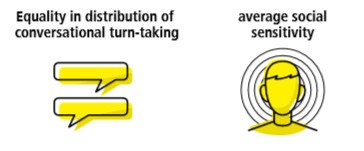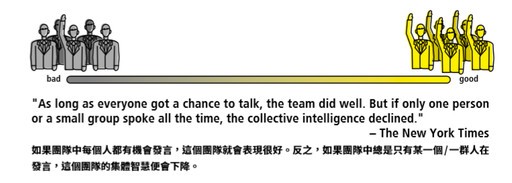Google建立黃金工作團隊的秘訣
紐約時報雜誌報導,幾年前Google開始了一個叫亞里斯多德的計劃,研究為什麼某些團隊運作得比其他團隊更好,他們發現了過去人們沒有注意到的事實,所有的黃金團隊都有兩項特質:平等的發言權和平均社交敏感度,嗯,聽起來有些玄,一起來研究。進入本文前,請先想想以下單字怎麼說:
(A) 仔細檢視
(B) 規範
(C) 實行
A few years ago, Google began a study called Project Aristotle to figure out why some teams work better than others. The researchers (1) knuckled down to it and started by reviewing past academic studies on how teams work, and then they (A) scrutinized the composition of groups inside the company. They gathered lots of data, but struggled to find patterns.
幾年前,Google 開始了一個名為亞里斯多德計劃的研究,目的是找出為什麼有些團隊運作得比其他的好。研究人員開始認真投入此項計劃,首先他們回顧了過去的相關學術研究,接著仔細檢視公司內團隊的組成。他們得到很多資料,卻難以找出規律。

Project Aristotle researchers then (2) came across research on “group (B) norms,” which are “traditions, behavioral standards and unwritten rules that govern how we function when we gather.” They began to look for norms in the data they had collected. Among all the norms they found, two were shared by all good teams: “equality in distribution of conversational turn-taking” and “average social sensitivity.”
亞里斯多德計劃的研究人員偶然看到關於群體規範(群體內的傳統、行為規矩、與不成文的規定)的研究,而開始在他們蒐集到的資料中尋找群體規範的存在。其中有兩個規範是所有優異團隊共有的:平等分配發言權,以及社交敏感度。

“Equality in distribution of conversational turn-taking” means that the members of a team spoke in roughly the same proportion, and “average social sensitivity” refers to the members' ability to tell how others felt according to their expressions, tone of voice, and other nonverbal cues. Both are aspects of so-called psychological safety.
平等分配發言指的是團隊中的每個成員有接近相等的發言機會,而社交敏感度則是指成員從他人的表情、音調等判斷他人情緒的能力。這兩者都是構成心理安全感的元素。
The next step is figuring out how to (C) implement psychological safety. Researchers found that psychological safety was related to emotional conversations, something that we do to bond with other people. When we (3) get to the bottom of it, Project Aristotle reminds us of the simple truth: In the best team, members always listen to one another, and see each other's feelings and needs.
接下來就是找出如何將心理安全感加以實行。研究人員發現,心理安全感與我們用以與他人建立關係的感性對話是相關的。探究亞里斯多德計畫的核心,它提醒了我們最簡單的真相:在好的團隊裡,成員會彼此互相聆聽,了解對方的感受和需求。
口語字彙
1. Knuckle down (+to sth)開始努力或用功學習
Knuckle是關節;這個用語來自玩彈珠時,為了彈得精準而把手指關節貼在地面的動作,進而延伸為認真、努力做某件事。
You're going to have to knuckle down (to your work) if you want to pass your exams. 如果你想通過考試,就必須開始用功。
2. Come across 偶然碰見;無意中發現
走在路上突然與某人/物面對面,指偶然中碰見。
I came across an old friend this morning. 我今天早上偶然遇見一位老朋友。
3. Get to the bottom of sth對…追根究底;找到…的真相
如同中文追根究「底」的意思。
I won't stop until I get to the bottom of this problem. 在我追根究底找出問題的根源之前我是不會停止的。
參考資料:http://www.nytimes.com
本文收錄於英語島English Island 2016年6月號
(A) 仔細檢視
(B) 規範
(C) 實行
A few years ago, Google began a study called Project Aristotle to figure out why some teams work better than others. The researchers (1) knuckled down to it and started by reviewing past academic studies on how teams work, and then they (A) scrutinized the composition of groups inside the company. They gathered lots of data, but struggled to find patterns.
幾年前,Google 開始了一個名為亞里斯多德計劃的研究,目的是找出為什麼有些團隊運作得比其他的好。研究人員開始認真投入此項計劃,首先他們回顧了過去的相關學術研究,接著仔細檢視公司內團隊的組成。他們得到很多資料,卻難以找出規律。

Project Aristotle researchers then (2) came across research on “group (B) norms,” which are “traditions, behavioral standards and unwritten rules that govern how we function when we gather.” They began to look for norms in the data they had collected. Among all the norms they found, two were shared by all good teams: “equality in distribution of conversational turn-taking” and “average social sensitivity.”
亞里斯多德計劃的研究人員偶然看到關於群體規範(群體內的傳統、行為規矩、與不成文的規定)的研究,而開始在他們蒐集到的資料中尋找群體規範的存在。其中有兩個規範是所有優異團隊共有的:平等分配發言權,以及社交敏感度。

“Equality in distribution of conversational turn-taking” means that the members of a team spoke in roughly the same proportion, and “average social sensitivity” refers to the members' ability to tell how others felt according to their expressions, tone of voice, and other nonverbal cues. Both are aspects of so-called psychological safety.
平等分配發言指的是團隊中的每個成員有接近相等的發言機會,而社交敏感度則是指成員從他人的表情、音調等判斷他人情緒的能力。這兩者都是構成心理安全感的元素。
The next step is figuring out how to (C) implement psychological safety. Researchers found that psychological safety was related to emotional conversations, something that we do to bond with other people. When we (3) get to the bottom of it, Project Aristotle reminds us of the simple truth: In the best team, members always listen to one another, and see each other's feelings and needs.
接下來就是找出如何將心理安全感加以實行。研究人員發現,心理安全感與我們用以與他人建立關係的感性對話是相關的。探究亞里斯多德計畫的核心,它提醒了我們最簡單的真相:在好的團隊裡,成員會彼此互相聆聽,了解對方的感受和需求。
口語字彙
1. Knuckle down (+to sth)開始努力或用功學習
Knuckle是關節;這個用語來自玩彈珠時,為了彈得精準而把手指關節貼在地面的動作,進而延伸為認真、努力做某件事。
You're going to have to knuckle down (to your work) if you want to pass your exams. 如果你想通過考試,就必須開始用功。
2. Come across 偶然碰見;無意中發現
走在路上突然與某人/物面對面,指偶然中碰見。
I came across an old friend this morning. 我今天早上偶然遇見一位老朋友。
3. Get to the bottom of sth對…追根究底;找到…的真相
如同中文追根究「底」的意思。
I won't stop until I get to the bottom of this problem. 在我追根究底找出問題的根源之前我是不會停止的。
參考資料:http://www.nytimes.com
本文收錄於英語島English Island 2016年6月號
